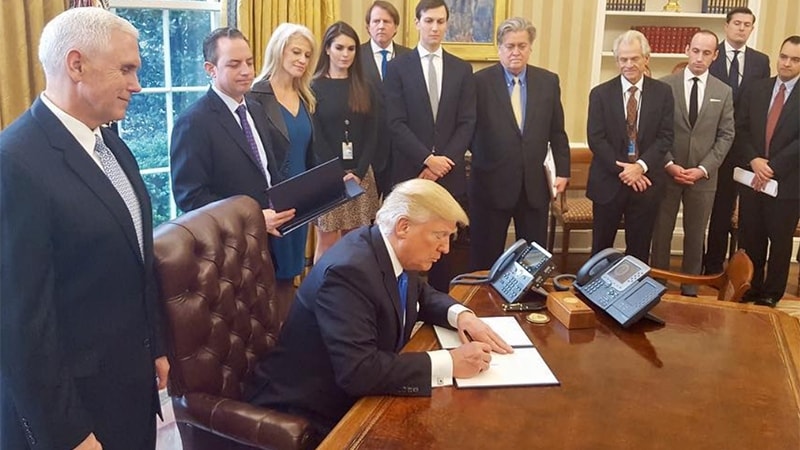
President Trump today issued an Executive Order that creates a structure to evaluate whether any foreign actors are attempting to influence U.S. elections and authorizes the government to impose “appropriate and meaningful sanctions against foreign individuals and entities determined to have engaged in election interference.”
The EO document released by the White House does not specifically mention Russia–which has been determined to have interfered with U.S. elections in 2016 by U.S. intel agencies–or any other foreign power.
The EO also declares a “national emergency” regarding the threat of election interference, in connection with the order’s findings that the ability of foreign persons to interfere with elections–including by accessing election and campaign infrastructure or the “covert distribution of propaganda and disinformation”–constitutes “an unusual and extraordinary threat to the national security and foreign policy of the United States.”
The order’s provisions indicate it may not do much to tackle pre-election interference, as it directs the Director of National Intelligence (DNI) to undertake an assessment within 45 days after a U.S. election to determine any foreign interference. The DNI would then deliver the assessment to the President, the Attorney General and the Secretaries of State, Treasury, Defense, and Homeland Security.
Within 45 days of that referral, the AG and DHS Secretary would advise the White House, State, Treasury, and DHS whether foreign interference targeting election infrastructure impacted security of election infrastructure, vote tallies, and timely delivery of election results.
Following further evaluation, foreign parties determined to have interfered with U.S. elections may be subject to a range of sanctions including having U.S.-based assets frozen, and being cut off from doing business with U.S. financial institutions.
Two senators who are pushing for passage of election interference sanctions–the Defending Elections from Threats by Establishing Redlines (DETER) Act–said today they appreciate the EO’s recognition of threats from foreign actors, but said the order “does not go far enough to address it.”
“The United States can and must do more,” said Sens. Marco Rubio, R-Fla., and Chris Van Hollen, D-Md., in a statement today.
“Mandatory sanctions on anyone who attacks our electoral systems serve as the best deterrent, which is the central tenet of the bipartisan DETER Act. We must make sure Vladimir Putin’s Russia, or any other foreign actor, understands that we will respond decisively and impose punishing consequences against those who interfere in our democracy. With only 55 days until the midterm elections, we urge our colleagues to send a clear and unified message to our adversaries by quickly passing this legislation,” the senators said.
Similarly, Sen. Sherrod Brown, D-Ohio, said at a Senate Banking, Housing, and Urban Affairs Committee hearing this afternoon that the sanctions threat contained in the EO “won’t substitute for mandatory sanctions required by law” in the DETER Act.
